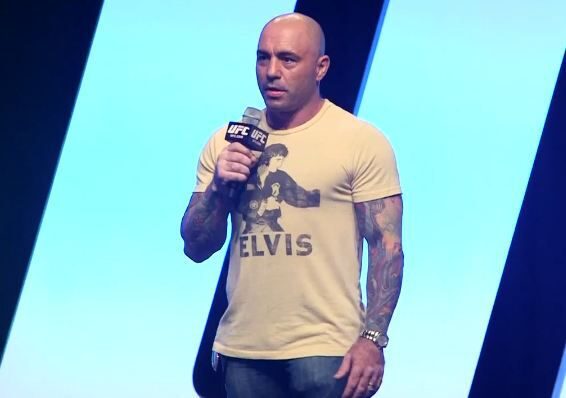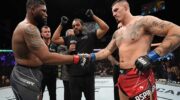Israel Adesanya has decimated or otherwise dominated the entire middleweight division since first arriving in the UFC. But he had one of his toughest challenges on Saturday night at UFC 271.
Adesanya needed to defeat Robert Whittaker, the former champion in order to retain his title. Whittaker had defeated Adesanya at their last meeting. A rematch is often more difficult, particularly with Whittaker who has made significant improvements since losing to Adesanya.
While it was a much closer fight, Adesanya still found a way to win, scoring a unanimous decision victory to remain champion. In doing so, he put Whittaker in his rearview mirror for the time being with a pair of victories against him.
In the co-main event, Tai Tuivasa shocked the Houston crowd at the Toyota Center after knocking out hometown favorite Derrick Lewis in a slugfest between two of the hardest hitting heavyweights on the entire UFC roster.
Tuivasa has always been a fun fighter to watch, but his win over Lewis will put him among the roster’s elite heavyweights.
There’s a lot to unpack from Saturday night, so let’s find out the passes and fails from the latest pay-per-view event. This is Making the Grade for UFC 271: Adesanya vs. Whittaker 2.
PASSES
They Can’t All be Easy
It is not always going be a highlight reel knockout. Israel Adesanya’s unceasing ability to defeat his opponent — regardless of circumstances — makes him one the most outstanding UFC fighters over the past few years.
Adesanya had to adjust his strategy to take on Robert Whittaker (a beast of a middleweight). He was clearly the best on the roster. Whittaker looked far better than in their first encounter, where he just charged at Adesanya, apparently without a strategy other than to get punched in a face a bunch of times.
Whittaker’s rematch was more strategic and included more takedowns. Clearly, he sought to replicate what Jan Blachowicz did to Adesanya in his lone UFC fight at 205 pounds. Despite that improvement, Adesanya still got the better of him on the feet, also showcasing an incredible ability to get up from the ground; he never allowed Whittaker to do any real damage.
In the end, Adesanya retained his title, and he did so against a much better version of Whittaker. Sure, everyone loves when he’s just styling on his opponents – like his first fight against Whittaker, or the night he hit Paulo Costa harder than three bottles of wine – but not every victory will by like that.
In fact, Adesanya needs to have nights where he’s not just torching his competition because that really answers the question of what happens when he faces adversity. How does he overcome it? How does he win on a night where an opponent is truly at their very best?
Adesanya responded to those questions Saturday night by a convincing performance against Whittaker. Perhaps the downside is that now that Whittaker has been beaten twice, he can arguably have his hardest opponent behind him.
Dropping Them ‘Bows
It’s impossible to predict if Tai Tuivasa is ever going to challenge the UFC heavyweight champion. He’s fast becoming one of my favorite fighters, and I enjoy watching him every single time he steps into the cage.
The always boisterous Aussie slugger has always lived or died by the philosophy of go big, or go home in all of his fights. He’s only gone to decision twice since joining the UFC roster, and there was a stretch where he lost three fights in a row, which could have easily ended with his exit from the promotion.
Instead, Tuivasa came charging back with four straight knockout wins and called for a fight with Derrick Lewis, probably the most terrifying power puncher in the heavyweight division outside of reigning champion Francis Ngannou. Lewis is known for his ability to get people insane enough to go on strike with him. The vast majority of them end up separated from their consciousness.
None of that scared Tuivasa. It might have even gotten him excited to face that level of threat.
Tuivasa went punch-for-punch with Lewis for over one round before landing an inside elbow that sent him crashing face-first to the canvas. After “Big Country”, Tuivasa had earned the reputation for having a hard chin and explosive hands, it was Shades of Mark Hunt against Roy Nelson.
The knockout earned Tuivasa an enormous bump in the heavyweight rankings. He’ll be looking forward to bigger fights. He faces some tough matchups, particularly when compared to a grappler like Curtis Blaydes and a swift-moving striker such as Ciryl Gane. But there’s little doubt that he’ll make it a show, even if he’s not the one walking out with his hand raised.
Fresh Meat
Sometimes it just works out in a championship race. Jared Cannonier gave a clear answer as to who would get Adesanya’s next shot.
Cannonier returned from a defeat against Robert Whittaker, which could have given him the title shot. He won two additional wins on Saturday, and a brutal knockout of Derek Brunson. Since his arrival at middleweight, he has been difficult to beat but now Cannonier is ready for UFC gold.
It’s not surprising that Adesanya considers Cannonier the “dark horse”, and it looks like they will finally meet.
Cannonier will surely be a sizable underdog in that fight. But at least he’ll present a fresh new option, because Adesanya has already dispatched everybody else at the top of the division — some of them he’s even beaten twice.
Cannonier should get his chance. Sean Strickland arguably is one more win away from potentially earning his own opportunity, and that will finally give Adesanya a chance to add to his legacy and literally wipe out every challenger at 185 pounds.
FAIL
It Texas, Even the Screw Ups Are Bigger
Yes, it’s that time again where judging in MMA earns another fail, but it’s impossible not to shine a light on some of the egregious scoring issues at UFC 271.
* Thankfully, none of these mind-boggling scorecards resulted in a loss. However, this doesn’t excuse judges from being held responsible. In fact, sometimes it’s even more important to call out these errors because there’s typically far less people paying attention when one scorecard is completely wrong but thankfully the right fighter still gets the win.
Let’s begin with the battle between Douglas Silva de Andrade & Sergey Morozov at the prelims.
Although de Andrade managed a remarkable comeback to win a submission, it was only after being nearly defeated on numerous occasions during the first round. Morozov hit de Andrade with two knockdowns and an almost submission in the opening round. He was only seconds from ending the fight.
Despite a completely lopsided performance, only judge Patrick Patlan gave Morozov a 10-8 score for that round. Judges Dan Miragliotta, who is also a referee, and Douglas Crosby both decided that Morozov inexplicably only deserved a 10-9 round.
Then there’s judge Robert Alexander, who somehow scored Roxanne Modafferi winning her fight against Casey O’Neill despite the Scottish-Australian flyweight landing more strikes against her than any athlete in the history of the 125-pound women’s division. Modafferi certainly put in a strong performance for her final fight, but it doesn’t necessarily mean that she won multiple rounds.
Even though Alexander had the worst scorecard, Kerry Hatley and Ivan Guzman, both referees, managed to award Modafferi at most one round. This is just as terrible. Every single media member scoring the fight via MMA Decisions gave O’Neill the win with a flawless 30-27 performance. These three judges, however, were apparently not watching the same fight.
Listen, judging in MMA can be a tedious job. There’s little praise when it goes right and an awful lot of criticism for calling it wrong. But that doesn’t mean there shouldn’t be consequences.
*]Commissions must do better in vetting and training judges. Andy Foster’s California implementation is a shining example. According to UFC Hall of Famer Frank Trigg, who now works as a referee in California, Foster requires all officials to go through extensive training as well as scoring or refereeing an exorbitant amount of fights at the regional level before getting the chance to work at bigger shows such as the UFC.
There’s hope that Texas will attempt similar scoring issues, or even more. This is especially true now that UFC considers Texas a second home.
EPIC FAIL
Missing In Action

Ahead of UFC 271 this past weekend, Joe Rogan was part of the broadcast team set to call the fights. But then suddenly, he had a “scheduling conflict” that prevented him from appearing in Houston. Although that was what the UFC had stated, Dana White immediately dispelled the rumor calling it “bullsh*t”. He said Rogan didn’t show up at the event and that it had nothing do with the scheduling conflict.
So what happened exactly?
Well, that’s the problem, because nobody actually knows, and it sure feels like something had to happen behind the scenes that prevented Rogan from calling the fights alongside Jon Anik and Daniel Cormier on Saturday night.
Of course, Rogan has been swept up in a number of controversies lately — all attached to his popular podcast on Spotify — where he was accused of spreading “dangerous misinformation” about the COVID-19 pandemic. Then, there was a video that surfaced that showed him using racial slurs numerous times over the years. Rogan apologized later, calling the incident “most regrettable and shameful” in his career.
While Spotify condemned Rogan’s use of racial slurs, the streaming platform stuck by him, and the $100 million deal he signed to bring his podcast there in 2020.
Meanwhile, the UFC has always stuck by Rogan — White has been one of his most vocal supporters over the years — and it’s difficult to believe the promotion would pull him from a broadcast. But what about ESPN and/or their parent company at Disney? Did the powers-that-be at ESPN decide that Rogan was too toxic to put on a broadcast amid all this controversy?
Is that the case? If so, then why did this message about scheduling conflict be created to justify his absence?
Neither White nor the UFC has provided any further context, and maybe it doesn’t matter in the grand scheme of things. But there was definitely something happening behind the scenes that prevented Rogan from appearing at the event.
If he pulled himself and decided not to serve as a distraction to the fights, why not just say that?
The whole thing was handled as badly as possible after White destroyed the public relations statement. This might all be a lot of nonsense, but if so, why was Rogan still on the call schedule for the fights, while White eviscerated the statement his public relations department released?
Perhaps Rogan had some important things going on backstage and couldn’t escape.

